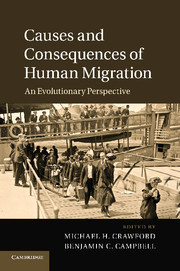Book contents
- Frontmatter
- Contents
- Contributors
- Preface
- 1 Perspectives on human migration: introduction
- Section 1 Theory
- Section 2 Geography and migration
- 8 Population structure and migration in Africa: correlations between archaeological, linguistic, and genetic data
- 9 Human migrations in North Africa
- 10 Identity, voice, community: new African immigrants to Kansas
- 11 The African colonial migration into Mexico: history and biological consequences
- 12 Demic expansion or cultural diffusion: migration and Basque origins
- 13 Consequences of migration among the Roma: immunoglobulin markers as a tool in investigating population relationships
- 14 Migration, assimilation, and admixture: genes of a Scot?
- 15 Mennonite migrations: genetic and demographic consequences
- 16 Human migratory history: through the looking-glass of genetic geography of Mycobacterium tuberculosis
- 17 Peopling the Tibetan plateau: migrants, genes, and genetic adaptations
- 18 Migration, globalization, instability, and Chinese in Peru
- 19 The great blue highway: human migration in the Pacific
- 20 Migration of pre-Hispanic and contemporary human Mexican populations
- 21 A review of the Tupi expansion in the Amazon
- 22 Molecular consequences of migration and urbanization in Peruvian Amazonia
- 23 Migration in Afro-Brazilian rural communities: crossing historical, demographic, and genetic data
- 24 Indentured migration, gene flow, and the formation of the Indo-Costa Rican population
- 25 Causes and consequences of migration to the Caribbean Islands and Central America: an evolutionary success story
- Section 3 Overview
- Index
- References
9 - Human migrations in North Africa
Published online by Cambridge University Press: 05 December 2012
- Frontmatter
- Contents
- Contributors
- Preface
- 1 Perspectives on human migration: introduction
- Section 1 Theory
- Section 2 Geography and migration
- 8 Population structure and migration in Africa: correlations between archaeological, linguistic, and genetic data
- 9 Human migrations in North Africa
- 10 Identity, voice, community: new African immigrants to Kansas
- 11 The African colonial migration into Mexico: history and biological consequences
- 12 Demic expansion or cultural diffusion: migration and Basque origins
- 13 Consequences of migration among the Roma: immunoglobulin markers as a tool in investigating population relationships
- 14 Migration, assimilation, and admixture: genes of a Scot?
- 15 Mennonite migrations: genetic and demographic consequences
- 16 Human migratory history: through the looking-glass of genetic geography of Mycobacterium tuberculosis
- 17 Peopling the Tibetan plateau: migrants, genes, and genetic adaptations
- 18 Migration, globalization, instability, and Chinese in Peru
- 19 The great blue highway: human migration in the Pacific
- 20 Migration of pre-Hispanic and contemporary human Mexican populations
- 21 A review of the Tupi expansion in the Amazon
- 22 Molecular consequences of migration and urbanization in Peruvian Amazonia
- 23 Migration in Afro-Brazilian rural communities: crossing historical, demographic, and genetic data
- 24 Indentured migration, gene flow, and the formation of the Indo-Costa Rican population
- 25 Causes and consequences of migration to the Caribbean Islands and Central America: an evolutionary success story
- Section 3 Overview
- Index
- References
Summary
Introduction
It may be said of human migrations that they have simple and sometimes unique causes, but in reality these causes are multiple with varied consequences. North Africa is no exception to this formula. Here, I describe a few examples of migrations in the region. The territorial occupation by Iwellemeden “Saharan walkers” are followed by “Mediterranean sailor” invaders whose needs will be far more limited: ports, trading ports, and urban habitats were therefore limited to coasts. They are the Near Eastern Phoenicians of the twelfth century BC. Then others, coveting more farmland, food, and therefore territorial expansions, are the Romans, settlers of the Eastern Maghreb or “Ifriqiya” (present-day Tunisia).
The Magreb is a land of great immensity and infinite space, welcoming human activity. But it is also a land of great severity where the wind, this master of aridity, has established the largest desert in the world, the Sahara desert. One consequence is that since the Neolithic Era, the Maghreb has received far more successive civilizations than urban masses were able to erase and replace the prehistoric bases of its population (Bousquet, 1961). Despite the difficult conditions, humans have learned to master this space using mobility, especially in the Sahara, a key region of this “desert culture” born there tens of thousands years ago.
- Type
- Chapter
- Information
- Causes and Consequences of Human MigrationAn Evolutionary Perspective, pp. 172 - 185Publisher: Cambridge University PressPrint publication year: 2012
References
- 1
- Cited by



